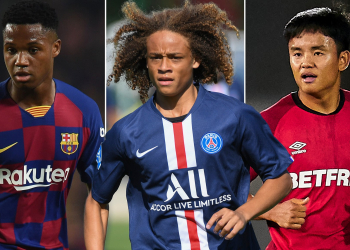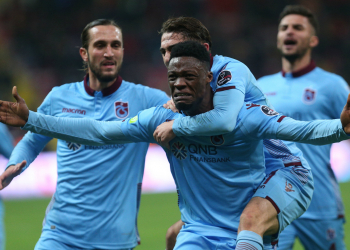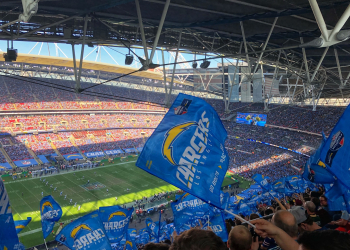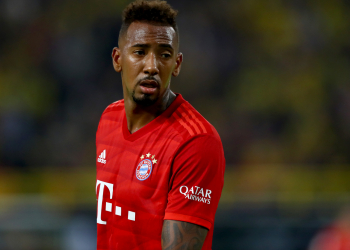At the 2018 World Cup in Russia commencing in June, Africa will be represented by the five countries who topped their qualification groups after three rounds of competition — Nigeria (Group B), Egypt (Group E), Senegal (Group D), Tunisia (Group A) and Morocco (Group C).
Of these, Senegal is currently the bookies’ favorite to finish as the top African nation, at odds of 15/8, followed by Nigeria and Egypt at 11/4. Morocco and Tunisia are currently at 7/1 and 10/1 respectively. However, none of the African nations competing in Russia are considered likely winners of the tournament — Senegal is the lowest priced at 150/1, while you can get as much as 750/1 on Tunisia being Africa’s first ever World Cup winners. To date, no African side has made it past the quarter final stage (Cameroon 1990, Senegal 2002, Ghana 2010), and if the online sports books are to be believed, even getting to this stage looks to be out of the question this time around.
When looking at the odds given by top bookmakers like betbright, which also offers casino games, you get a clear picture of the favorites for the World Cup competition, and how far off the pace the African nations are thought to be — the current favorites Germany are 9/2, followed by Brazil at 5/1 and France at 6/1, while Spain are currently priced at 8/1.
A brief guide to African nations at the World Cup
Nigeria were the first side from Africa to qualify for Russia after a 1-0 win over Zambia in their penultimate game. Since first making the World Cup finals in 1994, the Super Eagles have only missed out on qualifying once (Germany 2006).
Captain John Obi Mikel and midfielder Victor Moses were the leading lights during the qualifying campaign, but Nigeria (now ranked 51 in the world) will find the finals tougher going, being drawn in Group D with Argentina, Iceland and Croatia. With experienced German manager Gernot Rohr in charge, and a number of players on the books of Premier League clubs, the Super Eagles will nevertheless likely be depending on veterans Mikel and Moses if they are to have any hope of advancing in the competition for the first time, although keen observers also suggest that Kelechi Iheanacho, the 21-year-old Leicester City striker, could be a youngster who makes a name for himself in Russia.
Egypt (Group E) hasn’t qualified for a World Cup since Italia 90, but this time they did it with a game to spare, fired on by a late winner by Liverpool’s Mohamed Salah against bottom-of-the-group Congo.
This will be the third appearance for the Pharaohs in the World Cup finals who, despite possessing one of the world’s most in-form strikers in Salah, are noted for being sound defensively but without a great deal of attacking flair under Argentinian coach Hector Cuper. However, this approach has proved successful, with Egypt now ranked 30 in the world, and if Salah is on target and Arsenal defender Mohamed Elneny can keep them organized at the back, they have a slim chance of progressing out of Group A, although it’s hard to see them getting the better of hosts Russia and former winners Uruguay (Saudi Arabia are also in Egypt’s group).
Senegal topped Group D ahead of Burkina Faso, with Cape Verde in third and a disappointing South Africa in last place, to qualify for the World Cup finals for the second time (they previously appeared in 2002).
The Lions of Teranga currently sit at 24 in the FIFA rankings (behind only Tunisia). With former captain Aliou Cisse as coach, they will face Poland, Colombia and Japan in Group H, and they have perhaps the best chance of all the African nations of progressing beyond the group stages (current odds of topping the group are 9/2). Sadio Mane, now at Liverpool, has won over 40 caps for his country and is probably the most high-profile member of the squad, although hopes are high that Monaco’s Keita Baldé Diao will make an impression in his first major international tournament.
Tunisia won four of its six qualifying games in Group A and finished unbeaten, a point ahead of DR Congo, with Guinea and Libya finishing in third and fourth places. This will be Tunisia’s fifth appearance at the World Cup finals, although to date they have not progressed beyond the group stages. Unfortunately, they seem unlikely to go any further in 2018 either, having been drawn in Group G with Belgium, Panama and England.
Managed by Nabil Maaloul in his second spell in charge of the national team, many of Tunisia’s players ply their trade in the domestic league as opposed to turning out for European clubs, but despite this seeming handicap, Tunisia is currently the highest ranked African nation at 23 (having leapt four places this year). The key to Tunisia’s success (or otherwise) will likely be experienced Marseille defender Aymen Abdennour (on loan from Valencia), with ES Tunis midfielder Ghaylene Chaalali also expected to impress.
Morocco, now placed 39 in the FIFA rankings, had a triumphant qualifying campaign, remaining unbeaten and finishing four points clear at the top of Group C, which also included Ivory Coast, Gabon and Mali. However, they face a difficult task in their fifth Word Cup finals (having last qualified in 1998), as they are drawn in Group B alongside Portugal, Spain and Iran.
Coached by France’s Herve Renard, who has had previous African Cup of Nations success with Zambia in 2012 and Ivory Coast in 2015, Morocco will largely be relying on Juventus defender Medhi Benatia, who scored his first goal for the Atlas Lions in six years when he netted against Ivory Coast to seal qualification for Russia. Hakim Ziyech, the 24-year-old Ajax midfielder who has scored 7 goals in 13 appearances for his country, is expected by many observers to have a breakthrough tournament and to make his name on the international scene.
The teams who didn’t make it to Russia
Some of the bigger and more fancied names in African football who did not manage to qualify for Russia in 2018 include DR Congo, Cameroon, Zambia and Ivory Coast. However, the biggest surprise — and disappointment — was the failure of Ghana’s Black Stars to get through the qualifying rounds.
Having been the first African country to qualify for Brazil in 2014 (albeit ultimately finishing bottom of their group with only 1 point), hopes were high that not only would Ghana progress to the finals in Russia, but that they would at least equal their performance of reaching the quarter finals at the 2010 tournament in South Africa. However, they were sadly knocked out of their qualifying group (along with Uganda and Congo) which was ultimately won by Egypt — although the campaign was not without its fair share of controversy.
The Black Stars started poorly, picking up only two points from their first three games, and their unconvincing home form meant that they struggled to get their campaign back on track. They were, however, able to keep feint hopes of qualifying alive, but with two matches to go, Ghana’s fate was already out of its own hands and it was depending on other results to go its way.
And then came the final, fateful fixture against Uganda, and possibly one of the worse refereeing decisions ever endured.
With scores locked away at 0-0 in stoppage time during the final qualifying match, Raphael Dwamena scored what subsequent TV replays showed to be a perfectly legal goal, but which was inexplicably ruled offside by the match officials (this followed on from a disallowed penalty that should have been awarded to Frank Acheampong in the second half after he was clearly brought down inside the area). The offside decision was so egregious that it prompted the Ghana Football Association (GFA) to launch an offical protest as soon as the match finished in Kampala. Coach Kwesi Appiah and his players were understandably mystified and angered by the decision, which effectively brought the curtain down on a disappointing campaign and which ended Ghana’s chances of being able to play in Russia.
Where to now for football in Ghana?
Failure to qualify for the World Cup has unsurprisingly led to a great deal of introspection as to what went wrong and what the GFA needs to do next — some of which has been helpful, some of which less so.
According to Kwadwo Amaniampong, writing in the Guardian, the slashing of funding for the national team as a result of battles between the GFA and the former Minister for Sport has played a significant role in the Black Stars’ demise. He also suggests that ageing stars have not been adequately replaced and that young talent is not being nurtured for the national team in the right way.
Others, like K. B. Asante, have suggested that there is a general disenchantment with football in the country, as evidenced by the relative lack of excitement over Ghana’s most recent African Cup of Nations campaign. Some also believe that Ghana’s international stars are ultimately more interested in money than the honor of representing their country, and that recent drawn-out battles over payments and allowances have taken their toll on team unity and performance.
Administrators, too, come in for their share of criticism, notably GFA Chairman Kwesi Nyantakyi, as does the fact that football is not promoted in schools in the way that it once was, and that there are not enough facilities for youth to be able to enjoy the game in their free time.
Overseas players and coaches also bemoan the lack of professionalism in African football, in particular with regard to the state of pitches and training facilities, citing the declining overall standard of play in the most recent African Cup of Nations as evidence that football across the continent is regressing.
However, these are long-term infrastructure problems that will take some time to address. In the immediate future, players and officials need to turn their attention to AFCON in 2019, a tournament which, in the words of former star defender John Pantsil, Ghana needs to win “by any means possible.”
This article has 0 comment(s), give your comment
Join GhanaStar.com to receive daily email alerts of breaking news in Ghana. GhanaStar.com is your source for all Ghana News. Get the latest Ghana news, breaking news, sports, politics, entertainment and more about Ghana, Africa and beyond.




